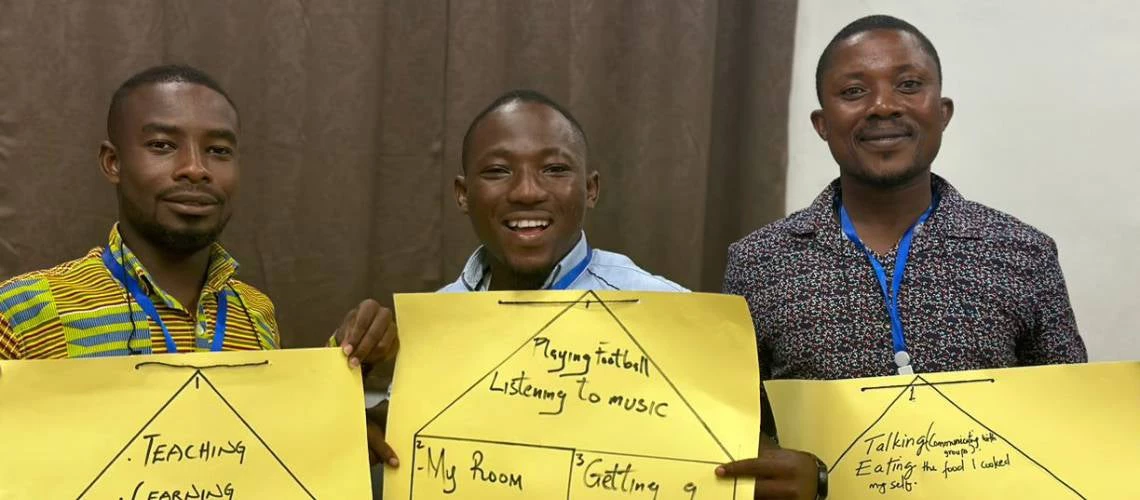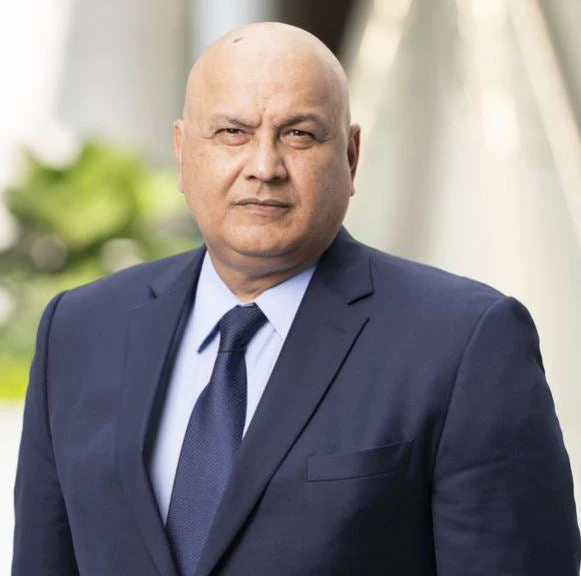 Staff of the national water utility in Ghana display materials from a leadership training session.
Staff of the national water utility in Ghana display materials from a leadership training session.
Floods, droughts, and poor sanitation are three facets of the global water crisis, which can be summed up in terms of too much, too little, and too polluted. Today, 1.81 billion people face significant flood risk, 2.3 billion lack access to safely managed water, and 3.5 billion lack access to safely managed sanitation. These challenges are exacerbated by the intensifying effects of climate change, rapid population growth, and rising food insecurity.
Burgeoning populations mean there may be a 40% shortfall between forecast demand and available supply of water by 2030. Looking ahead to 2050, it is projected that as many as 3.2 billion people will live in areas with severe water scarcity. Lack of access to water supply, sanitation, and hygiene (WASH) services contributes to weak educational outcomes and is a major risk factor in the spread of disease. These risks disproportionately affect the poor and those in conflict-affected regions. In West Africa, for example, basic sanitation services are accessible to only 16% of the population in Sierra Leone, 17% in Liberia, and 25% in Ghana.
Alone, developing countries cannot tackle these challenges, which are complex and cut across sectors and national borders. A holistic, collaborative approach is needed—and that is what the Global Water Security & Sanitation Partnership (GWSP) provides.
No development without water
The GWSP is an action-oriented think tank and platform for collaboration that is committed to creating innovative and timely solutions to global water challenges. The GWSP is housed within the Global Water Practice of the World Bank, which is the largest multilateral financier of climate action and water-related development in developing countries. The World Bank recognizes that water touches almost every aspect of development: without water security, countries will fail to achieve most of the other Sustainable Development Goals (SDGs). To date, the World Bank has invested $28.12 billion in 163 water projects and influenced at least $34.1 billion in other water-related lending activities.
The World Bank’s Global Challenge Program on water—Fast Track Water Security and Climate Adaptation (WSCA)—due to be launched in the spring, is designed to strengthen water security and related climate adaptation through systems change and targeted investments in water, sanitation, irrigation, water resources management, and by reducing flood and drought risks. The program, which will be supported by the GWSP through technical expertise, solutions, tools, and global and country diagnostics, will help countries create ambitious reform roadmaps and design projects with customized analytics to enable them to meet the SDGs related to food, water, and climate.
The GWSP helps governments strengthen their policies, institutions, and regulations, scale up investments in water infrastructure and services, and manage their water in ways that promote green, resilient, and inclusive development. Projects cover a range of areas: achieving universal access to safe water supply and sanitation services; improving irrigation models and water productivity; implementing sustainable water resources management to reduce the risk of flood and drought; and enhancing water security in fragile and conflict-affected regions.
A groundswell of GWSP projects in West Africa
In West Africa, the GWSP has a strong track record of providing technical and diagnostic support to governments to address water challenges. A GWSP report examines innovative approaches to providing safely managed sanitation in Ghana through container-based sanitation. In Liberia, the GWSP supported the production of a diagnostic brief that analyzes the delivery of WASH services and their central role in improving child health, human capital, and development outcomes. In Sierra Leone, the GWSP supported a pilot study to test the feasibility and utility of indicators for a global framework of rural water metrics that would help improve national and global reporting on and provision of rural water services. GWSP grants support a variety of active projects. For example, in Ghana, one GWSP project is focusing on improving the operational and financial performance of the Ghana Water Limited by upskilling change leaders, while another aims to increase access to improved sanitation and water supply in low-income communities in the Greater Accra and Kumasi Metropolitan areas.
The bedrock of a water-secure future
Partnerships are the bedrock of a water-secure future. They provide opportunities and a framework for sharing knowledge, mobilizing funding, and providing technical assistance. A core part of the GWSP’s work is to foster collaboration among governments, public and private sector players, and multilateral development partners on water-related development priorities. Our strength is in putting knowledge into action and promoting a holistic, cross-sectoral approach. But we are only able to perform this role thanks to support from partners working on the global water agenda. We benefit from partners’ strategic guidance, technical expertise, and financial contributions. Partners help us bring cutting-edge technologies and innovative ideas to World Bank clients, and in-country partnerships are vital for ensuring GWSP water projects are effectively implemented.
This collaborative approach will be on display at this year’s GWSP Council Meeting, due to be held in Accra, Ghana, from February 20 to 22, 2024. The meeting will bring together client governments, global and regional development partners, and members of the private sector for an update on global water developments, the GWSP’s achievements in FY23, and its work plans for the future. Delegates will discuss challenges and priorities in the water sector of particular countries, notably Ghana. The event will also be an opportunity for in-country partners to learn about our Knowledge into Implementation model and how to collaborate on the World Bank’s Global Challenge Program on water. Delegates will visit sites in Ghana and Sierra Leone for first-hand insight into how our programs are improving water supply, promoting hygiene in schools, and building capacity in government institutions.
The global water crisis may be a matter of too much, too little, and too polluted—but it is not too late for us all to work together in developing short- and longer-term interventions. Solutions are at hand in the form of finance and technical expertise, and partnerships are the best way to access them.



Join the Conversation